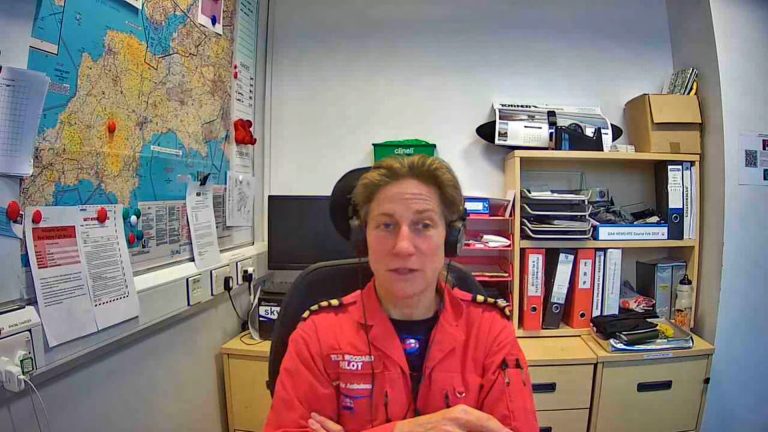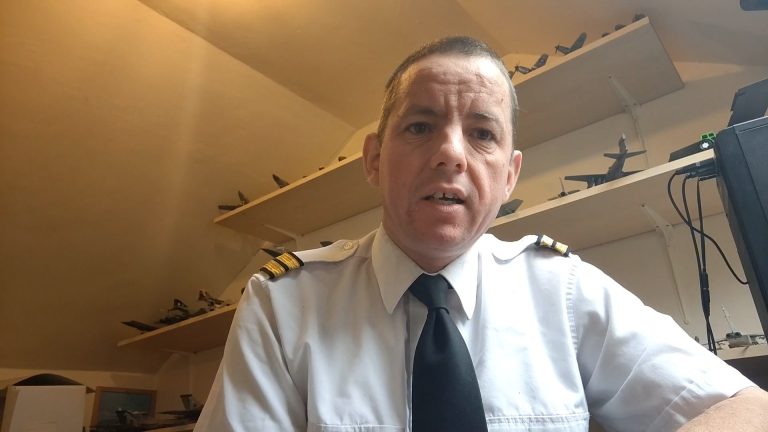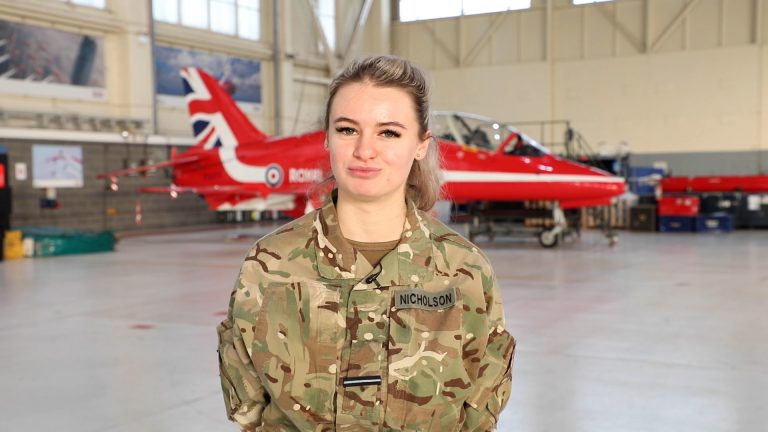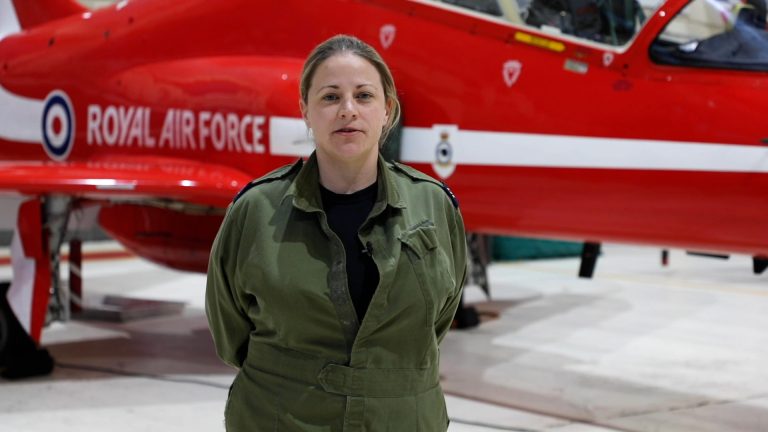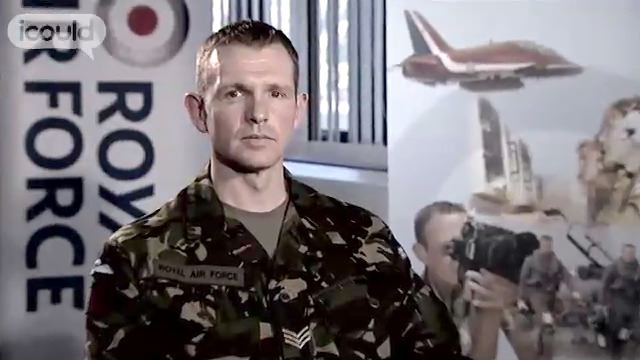Explore: Security and armed forces
Former Tornado GR4 Pilot
RAF
info Issues viewing the video?
icould and Inspiring the Future Mandy, Former Tornado GR4 Pilot Royal Air Force
| Time Code | Audio |
| 00:00:07 | Hi, my name is Mandy Hickson. I’m a former Royal Air Force Tornado GR4 pilot. In other words, I used to fly something that looks a lot like that. |
| 00:00:17 | One of my favourite aspects of this job was the fact that it’s so exhilarating. The sheer pleasure of taking off in 35 million pounds’ worth of amazing aircraft and flying low level around Wales or the Lake District. |
| BEING A FIGHTER PILOT | |
| 00:00:32 | You’re posted to lots of different bases in the Air Force, so you do move around quite a lot, which when you’re young, I really loved. I loved the fact that every 3 years you change jobs as well, so you’re taking on lots of different roles. You’re getting promoted, you work up through the ranks as well. |
| SKILLS | |
| 00:00:48 | One of the aspects of personality that’s really handy to have within that job is I would say to be a fairly good decision maker, a really good team player and actually that is probably one of the most important aspects actually. If you’re the sort of person that really enjoys working with different people as well, from lots of different walks of life. It’s handy if you have leadership skills as well and you have the ability to make decisions very quickly. |
| EDUCATION | |
| 00:01:16 | I grew up in Manchester. I started off at an all girls’ school. I was very sporty, I loved theatre and drama as well and it was while I was at school I joined an external club called the RAF Air Cadets and I joined that when I was 14. It had just opened its doors to girls and I joined on one of the very first nights. When I was there I absolutely loved it. I got to fly, I did things like night exercises, I played netball and hockey for them and you basically get fully immersed in the, what the RAF is looking for in its youngsters. |
| 00:01:55 | I did all my A Levels, I did pretty science-based subjects actually. I was, I really prefer the stem side of things, so I did Biology, I did Physics, I did Maths as well and I did Geography, so I loved Geography. Went off to university in Birmingham and I studied Geography and Sports Science. I was still very keen though to join the Royal Air Force and at 17 I was awarded a Flying Scholarship and that gave me enough hours to build on, to gain my private pilot’s licence and so now I was really on this track to becoming a pilot. |
| CAREER INSPIRATION | |
| 00:02:26 | My grandpa was a pilot in the Second World War and I think it was through hearing his stories that first actually enticed me into joining the Air Force. Then when I was at university, one of the really influential figures for myself was the boss of the University Air Squadron and I had been struggling to pass all the computer-based aptitude tests because life’s not always that easy and I failed them once and then I failed them twice and he really believed in me and went the extra mile for me to get me through and it completely changed really my route through the Air Force really. |
| ADVICE | |
| 00:03:01 | To get started in this line of work I would definitely recommend joining something like the air cadets or the university air squadrons because it does give you a really good insight into it. If I had to give my younger self some words of advice, I would say, believe in yourself. It’s amazing what you can achieve actually when you do have that little bit of belief, But also don’t be fearful of failing. I’ve failed many times throughout my entire career and actually we learn through failing. It’s how we deal with that, whether we let it destroy us, whether we take it as a hit and we don’t come back from it, but building up that resilience that we need and becoming a bit more of a robust character, can really help you in your future careers as well, so yeah, my top tips would be to believe in ourselves and to overcome that fear of failing. |
| 00:03:47 | END OF TRANSCRIPTION |
“Don’t be fearful of failing. I’ve failed many times throughout my entire career and actually we learn through failing.” Joining the RAF Air Cadets and then her University Air Squadron set Mandy on the path to becoming a pilot. At the end of her RAF service, she retrained as an airline pilot before opting for a complete career change. She now works as a motivational speaker.
More information about Ship and hovercraft officers
Data powered by LMI For All
£57,720
average salary
The UK average salary is £29,813
43
average weekly hoursThere are 37.5 hours in the average working week
94%
male
6%
female
The UK workforce is 47% female and 53% male
Future employment
Future employment
Description
Ship and hovercraft officers command and navigate ships and other craft, co-ordinate the activities of officers and deck and engine room ratings, operate and maintain communications equipment on board ship and undertake minor repairs to engines, boilers and other mechanical and electrical equipment.
Qualifications
Entrants usually possess GCSEs/S grades and A levels/H grades. Good colour vision without spectacles or contact lenses is required for some posts and candidates must undergo a medical examination. Training lasts three to four years and combines taught courses and assessed training at sea.
Tasks
- Allocates duties to ship’s officers and co-ordinates and directs the activities of deck and engine room ratings
- Directs or undertakes the operation of controls to inflate air cushions, run engines and propel and steer ships, hovercraft and other vessels
- Locates the position of vessel using electronic and other navigational aids such as charts and compasses and advises on navigation where appropriate
- Monitors the operation of engines, generators and other mechanical and electrical equipment and undertakes any necessary minor repairs
- Maintains radio contact with other vessels and coast stations
- Prepares watch keeping rota and maintains a look-out for other vessels or obstacles
- Maintains log of vessel’s progress, weather conditions, conduct of crew, etc
Employment by region
Top 10 industries for this job
Warehousing, etc
5683
Wholesale trade
2653
Other trans. equipment
2122
Sale of motor vehicles
2114
Rubber & plastic
1777
Water transport
1367
Architectural & related
1288
Employment status
Related career stories
⇦
⇨



